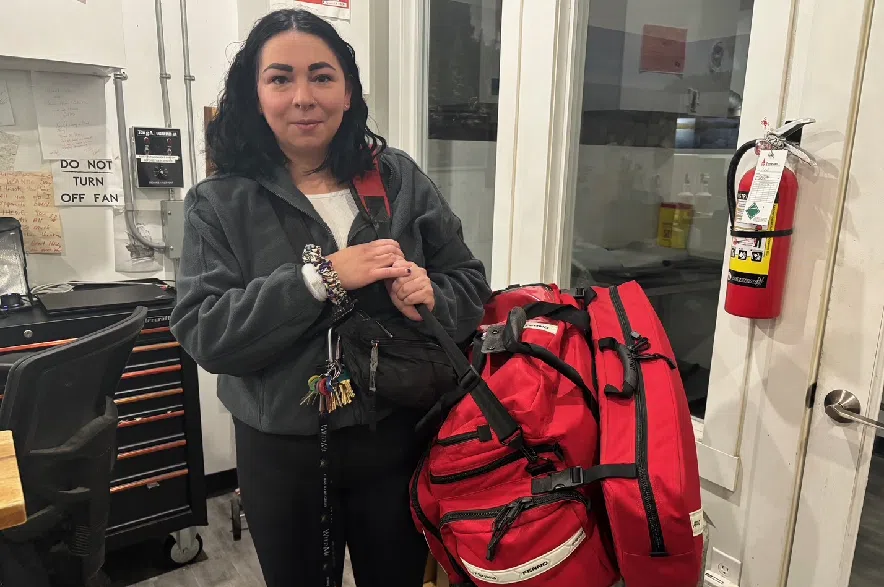As the overdose crisis in Saskatoon continues, staff at Prairie Harm Reduction say they’re dealing with multiple overdoses every day.
In March, Saskatoon firefighters responded to 509 overdose calls or suspected opioid poisonings around the city, and a total of 816 since January 1.
Read More:
- Saskatoon Fire Department responding to average of 19 overdoses per day
- Supervised consumption site left out of budget, ‘drowning’ in overdose crisis
- Saskatoon’s only supervised consumption site reopens

Prairie Harm Reduction operates Saskatoon’s only supervised consumption site. While the site is not currently open, staff members are still frequently responding to overdoses. (Mia Holowaychuk/650 CKOM)
Prairie Harm Reduction is currently searching for an on-site paramedic, meaning the city’s only supervised consumption site is not currently open, though the organization is still providing other services in the community.
But Kim Randall, the organization’s director of support services, said staff members are still responding to frequent overdoses, some inside the building and others outside in the alley.
Randall said Prairie Harm Reduction is equipped with a 30-pound “go bag” that includes emergency supplies such as naloxone, a pulse oximeter – which measures a patient’s blood oxygen saturation and heart rate – and a supply of oxygen.
“One of us grabs (the bag), one of us has 911 in our hand and the other is down with the person who’s overdosing,” Randall said
“We just kind of all work together. It’s very chaotic, but we just do what we need to do.”
Sometimes staff find themselves responding to multiple overdoses at once, Randall added.
Randall described the “super tense” feeling of working to treat an overdose.
“It’s like this stiff robot working an overdose. Once they’re breathing and once everything’s OK… it’s like I can breathe.” she said.
“That person was dead five minutes ago, and now they’re up… It’s a sigh of relief.”
One of the hardest parts of dealing with overdoses, Randall said, is watching staff members work on someone for several minutes without a response, even after paramedics or firefighters arrive.
“It seems like it’s going on for hours, even though it’s a short amount of time.”
Randall said staff members make an effort to take care of each other through constant communication so they don’t get burned out.
“We ask each other where our capacity is at, because some days we’re not going to have any and that is totally fine,” Randall said. “We’re here because we care for folks.”
Randall said staff members also build strong connections with the people they support by getting to know their life stories, struggles and experiences. She said clients often ask staff about their families and also notice when the staff members are away.
“Seeing them overdose and take a long time to respond is really hard,” Randall said.
“We’re taking things day by day.”
Unlike the other services provided at Prairie Harm Reduction, its supervised consumption site is not funded by the provincial government, and relies solely on donations.
Randall said that “people deserve more than what they get.”
Keeping doors open for more support
In addition to operating its safe consumption site, Prairie Harm Reduction also offers several support services for those in need.
Monica Stoneham, the organization’s director of youth services, said Prairie Harm Reduction operates group homes for young people from ages 16 to 21.
She said the program takes in those who have been through multiple other programs and have nowhere else to go, often due to issues with substance abuse and behaviour.
“We take them and we give them a home and a space where they can be teenagers,” Stoneham said.
Stoneham said she has seen great success rates from the dozens of youths the program has helped.
“It’s great to see them be able to succeed and have great lives, because they deserve it,” she said.
Prairie Harm Reduction also runs a support program that helps hundreds of families who are either at risk or currently involved with social services. The program helps individuals keep their kids at home or assists them in having their children returned to them
The organization also runs an education department, which offers naloxone training sessions to the public and various groups.
Aly Wedler, Prairie Harm Reduction’s director of education, said she is also running trauma-informed care training for health-care professionals and social workers across the province.
Wedler said the training is “essentially teaching people that everyone you meet has trauma, and how to be sensitive to their trauma and how to approach them in a kind, gentle, understanding way, essentially teaching compassion.”
In this year’s provincial budget, the Ministry of Health provided Prairie Harm Reduction with $340,000 for its community outreach, education programming and peer-support programming.
–with files from 650 CKOM’s Lara Fominoff












